Did you know there are several different types of magnesium that are beneficial for different things? When my doctor recommended taking magnesium for migraine, they just gave me the general term without specifics. So which magnesium was best for me? I had to do some research to find out!
This article was originally published December 2018 and has since been reposted and repeated on a number of different migraine sites, including Migraine Again. This is the original article.
Jump to:
- Magnesium for Migraine
- Magnesium Bioavailability Matters
- Recommended Magnesium Dosage
- Types of Magnesium for Migraine
- Magnesium Glycinate
- Magnesium L-Threonate
- Magnesium Chloride & Magnesium Sulfate (Salts and Lotions)
- Magnesium Malate
- Magnesium Citrate
- Magnesium Oxide
- Magnesium Orotate and Magnesium Taurate
- Magnesium IV Therapy
- Fillers, Gelatin and Binding Agents
- Magnesium Posts
Magnesium for Migraine
Migraine disorders can be linked with magnesium deficiency, making supplementation of magnesium for migraine necessary for most of us. However, if you’re finding that you have more digestive “issues” when upping your magnesium intake, you’re not alone.
I wasn’t aware until I started doing a little more research after my Migrelief formula was changed. I realized that the magnesium type in this particular supplement (magnesium oxide) was known for laxative properties - this was something I did not need!
When people search for a new magnesium supplement without knowing what to look for, they usually focus on price. This means many aren’t getting the full potential out of supplements and most likely won't see a difference with symptoms.
There are usually three reasons why someone wouldn't see a benefit of magnesium for migraine:
- Our body doesn't react well with the type of magnesium we're taking.
- The supplement contains a lot of fillers, making it poor quality and difficult to absorb.
- The capsule contains gelatin, which can be a migraine trigger for some people when taken everyday.
- The amount that is being taken is either not enough to make a difference, or too much to handle.

Magnesium Bioavailability Matters
According to Ancient Minerals, “If one was to ingest the commonly recommended (albeit modest) adult dosage of 300-400 mg magnesium per day in (a) poorly absorbed form, it could equate to a usable dosage of only 12-16 mg.”. They also go on to quote Holy Water, Sacred Oil: The Fountain of Youth where it is mentioned that magnesium is most effective when contained in the intestine for a minimum of 12 hours. If magnesium was going through the system faster (ie. in the form of diarrhea), you’re not getting the full benefits of the supplement you’re taking.
One key word to know is “bioavailability”, which means how well the supplement is absorbed by the body. If the supplement you’re taking is not very bioavailable, it’s not being metabolized and you’re probably not reaping the benefits from it.
As we age and our metabolism slows, it can be even more important to focus on bioavailability, as vitamins can become more difficult to absorb. This is why choosing high quality supplements is so important. Fillers, binders, and artificial ingredients or flavorings can all limit absorption. Magnesium itself isn’t a highly absorbable supplement to begin with, but if you have a deficiency then your body will be able to absorb more than it would otherwise.
Recommended Magnesium Dosage
Neurologists generally recommend taking 400-600mg a day of magnesium for migraine prevention because that is the amount used in studies showing its efficacy. This is also why most doctors will recommend magnesium oxide. It is inexpensive and has proved to be helpful in scientific studies, most recently in a 2021 study. However, as a migraine patient and someone speaking with patients daily, this is not the most well-tolerated option in these amounts.
It's important to note these amounts are the elemental value. Occasionally brands will print the maximum value which makes it look like 1000+ milligrams of magnesium in one pill when the elemental value will be 50mg. Look carefully at what you're buying to make sure it is in elemental values.
Taking higher amounts of magnesium can lead to digestive upset and diarrhea, particularly with magnesium oxide. To get to the amount recommended for migraine, many of us have to combine types of magnesium.
Personally I do a combination of magnesium threonate in 72mg, which helps with morning brain fog, about 300mg of magnesium citrate, which helped with regularity postpartum, and about 240mg of magnesium glycinate which totals about 600mg a day. I'll add in more magnesium glycinate during attack days, or use magnesium lotion. This is a combination I've changed around over the years which just shows you may need different dosages at different times.
It's important to discuss the dosages with your doctor and get the maximum amount recommended for you.
A Note on Blood Tests - Blood tests for magnesium are not an accurate reflection of deficiency, especially for people with migraine. If your neurologist orders a blood test and tells you that you don't need magnesium supplementation because you're not deficient, this is a red flag. It's important that magnesium crosses the blood brain barrier, where you need it the most!

Types of Magnesium for Migraine
What's the best type of magnesium for migraine? Truthfully I can't answer that. Because what works well for me for vestibular migraine prevention and acute treatment may not work for you.
Over the years after speaking with thousands of people, I know what seems to work the best for the majority, but there will always be people who don't follow the normal path. I recommend reading through the different types and deciding what might work best for the issues you have.
Another thing to watch for when researching magnesium supplements? How many articles are connected to a brand selling their product. I tried to sort through all that for you to bring you a quick breakdown of each form. Here are some of the most popular types of magnesium for migraine.
Magnesium Glycinate
This type of magnesium is one of the most effective at boosting low levels of magnesium quickly, without causing digestive problems or diarrhea. It is ideal for those who cannot tolerate the laxative effects of citrate or oxide and need a more well absorbed form. Because migraine patients are recommended to take around 400-600mg daily, it’s the best way to make sure you’re getting a higher amount in and not losing it all in the toilet, for lack of a better phrase.
Glycine, an amino acid to which the Magnesium is bonded, supports cognitive function and calms neural functions. Therefore patients find this form helps with reducing inflammation, sleep, and anxiety, making magnesium glycinate great for those with Vestibular Migraine.
Final Thought: Magnesium glycinate is good for anxiety, vestibular migraine, and if you have a sensitive stomach.
Recommended Brand: Pure Encapsulations and Magnesium Glycinate Powder(for those who cannot tolerate pills). I have these brands and more available for a discount in my private supplement store.
Magnesium L-Threonate
A newer type of magnesium, magnesium L-threonate is one of the only forms of magnesium that has been shown to penetrate the blood brain barrier, directly raising the magnesium levels in the brain. In studies, it played a positive role with improving Alzheimer’s and other cognitive issues.
Developed by MIT grads, Magtein promotes improvement of learning abilities, memory, and cognitive function. It even helped me get rid of my morning brain fog, a common symptom with Vestibular Migraine. This type also doesn’t contain laxative properties that you would find with citrate or oxide. The downside? It’s expensive. But since I wrote this article almost five years ago, this is becoming a widely recommended supplement, just based on my own experience with threonate for migraine, as well as my readers!
Threonate is a good supplement to use in addition to another form of magnesium so you're saving money, and reaping benefits from both. It would be difficult to get the total amount you need when most capsules only contain 72-144mg total.
Final Thought: Magnesium Threonate is good for cognitive function, energy, and brain fog.
Recommended Brands: Pure Encapsulations and Teraputics. I have these brands and more available for a discount in my private supplement store.
Magnesium Chloride & Magnesium Sulfate (Salts and Lotions)
You might be more familiar with epsom salts, also know as magnesium sulfate. Through research and discussion with other Migraine patients, it seems as if magnesium chloride is like Epsom salt on steroids. It appears to have better absorption and cellular penetration, as well as lower tissue toxicity. This form of magnesium is wonderful for topical applications, especially if you’d like to supplement your oral intake. This would include adding it to a bath, foot soak, or applied topically in a lotion or spray form.
Concentration of the solution, length of time it is in contact with the skin, and area it is applied all affect magnesium chloride’s efficacy. Some find that if they do a soak for 20-30 minutes or apply to their feet before bed it helps to calm the body and promote a deeper sleep.
On the other hand, there’s not a lot of great scientific research to back this up according to this 2017 study. I read a quote the other day that said something to the effect of “a placebo is the perfect example of how healing starts with the mind”. I personally believe there’s more merit to topical magnesium than this study suggests, and it’s worth a try to see if it truly helps you. Since chloride is more expensive than epsom salts, I like to mix both if taking a full bath.
Final Thought: Topical magnesium is good for those looking for relaxation and adding additional magnesium without digestive upset. Great for those who cannot tolerate capsules.
Recommended Brand: Ancient Minerals Bath Salts and Goodnight Lotion. I have these brands and more available for a discount in my private supplement store.
Magnesium Malate
Magnesium malate has great reviews for those suffering with fibromyalgia and chronic fatigue syndrome. It's a combination of malic acid and magnesium, which is said to have a higher bioavailability. Another positive is that it supports energy production and an ability to chelate toxic metals. Aluminum is linked to neurological disorders, so it may be beneficial for anyone concerned with this aspect.
Malate also creates less GI stress than citrate and oxide. The only downside from reports was some find it too energizing. Therefore it is recommended to take in the morning. It also could potentially be too stimulating for those with Vestibular Migraine.
Final Thought: Magnesium malate can be good for fibromyalgia and chronic fatigue syndrome/ systemic exertion intolerance, if comorbid with migraine.
Recommended Brand: Seeking Health Malate Powder and Designs for Health Capsule. I have these brands and more available for a discount in my private supplement store.
Magnesium Citrate
One of the most popular and well-studied forms of magnesium, magnesium citrate bonds to citric acid, making it more absorbable than some other forms like oxide, but also larger pills with less elemental magnesium because citric acid is a larger molecule. If you google "magnesium citrate", you’ll notice it’s promoted to relieve constipation - which is especially great for postpartum or pregnant women! However, if you’re taking this at the 400+mg recommended amounts each day, it could cause diarrhea. If it does, consider lowering the dosage and replacing with another type, like glycinate or threonate.
This type of magnesium mixes well with liquids and could be an option for those who cannot tolerate pills.
Final Thought: Magnesium citrate is widely available and well-absorbed, if tolerated without digestive upset. Could be a great option for pregnant and postpartum moms who struggle with constipation.
Magnesium Oxide
Neurologists recommend this form most often because it is used in studies for migraine relief, it's cheap, and it is widely available. Because it is a smaller molecule, it can come in smaller pills with a greater elemental value, meaning you won't have to take as many to get a high dosage. Yet many patients find they cannot reach the maximum dosage without causing some digestive upset, or they don't see a huge benefit from it.
While magnesium citrate can relieve constipation, oxide is commonly used to relieve heartburn and as a laxative. It is not as bioavailable as magnesium citrate. In my opinion, there are better forms out there that will be more highly effective if you're not seeing results.
Final Thought: Magnesium oxide is well-studied, but not the best form for absorption and can cause digestive upset in large amounts.
Magnesium Orotate and Magnesium Taurate
I’ve seen mixed reviews on magnesium orotate and simply not enough good evidence to make a suggestion for it. It seems to be helpful with heart related issues.
Taurate, the amino acid taurine combined with magnesium, is more well-studied. It has been shown to reduce heart attacks and promote stable blood sugar levels. In studies, magnesium taurate was effective in migraine prevention while having limited side effects. If you also have cardiovascular issues, this could be a good choice for you.
Final Thought: Magnesium taurate is good for those who need to stabilize blood sugar levels or have cardiovascular issues.
Recommended Brand: Natural Rhythm makes two kinds. Here is the Magnesium Taurate by itself. Triple Calm combines glycinate, malate, and taurate. The only downside is if it starts to help you, you won't know exactly which type is helping or if it's the collection of them. I have these brands and more available for a discount in my private supplement store.
Magnesium IV Therapy
An expensive but occasionally necessary option, magnesium IV therapy can be helpful for severe hydration or intense attacks without a visit to the emergency room.
IV therapy at home typically costs about $150-300 (in the Dallas area) so I use it as a last resort. Still, it is less expensive than an emergency room visit. During the pandemic, it has been especially helpful to avoid going to the ER. Two years ago I had an attack so bad that I couldn't use my fingers to type, and I was hosting a Healthline chat later that night. A magnesium IV at home got them working again within just an hour.
Google "IV therapy" near me to find one in your area. This is an example of one I have used in the Dallas area - Nuuvo.
Fillers, Gelatin and Binding Agents
Gelatin - As always, even when choosing supplements, we must check the ingredients - the fewer the better. I find it easier to search for vegetarian or vegan capsules, which eliminate gelatin. Some patients find gelatin, even in a small capsule form, a potential Migraine trigger. I often wonder if people mistake this for a reaction to the supplement as it's easier to blame the attack on the supplement itself. Since there are many vegan alternatives out there, it’s better to avoid gelatin unless you know it does not bother you.
Fillers and binding agents - These are cellulose, stearic acid, and magnesium stearate. Magnesium stearate has the most controversy of them all due to a 1990 study which found that suppressed cells that are responsible for the immune system. I've also read in some of my Migraine groups that it appeared to be a trigger for a few people.
Fillers by themselves are not necessarily as bad as they sound. Some manufacturers use them to bulk up which might be a very tiny product without it. What you want to be careful of is brands that are using more fillers than actual product. While it may be less expensive, the fillers won’t be helping you feel better in the long run. The goal is not to eliminate the fillers entirely, but to choose brands with very few of them in the ingredients. Having only one is best! That's why I've recommended the brands above.
A few people do find that certain forms of magnesium can make them dizzy or feel worse. It can take some trial and error to find the perfect form for you. Always consult your doctor before trying a new supplement. If you have any feedback about any of these supplements, let me know in the comments.
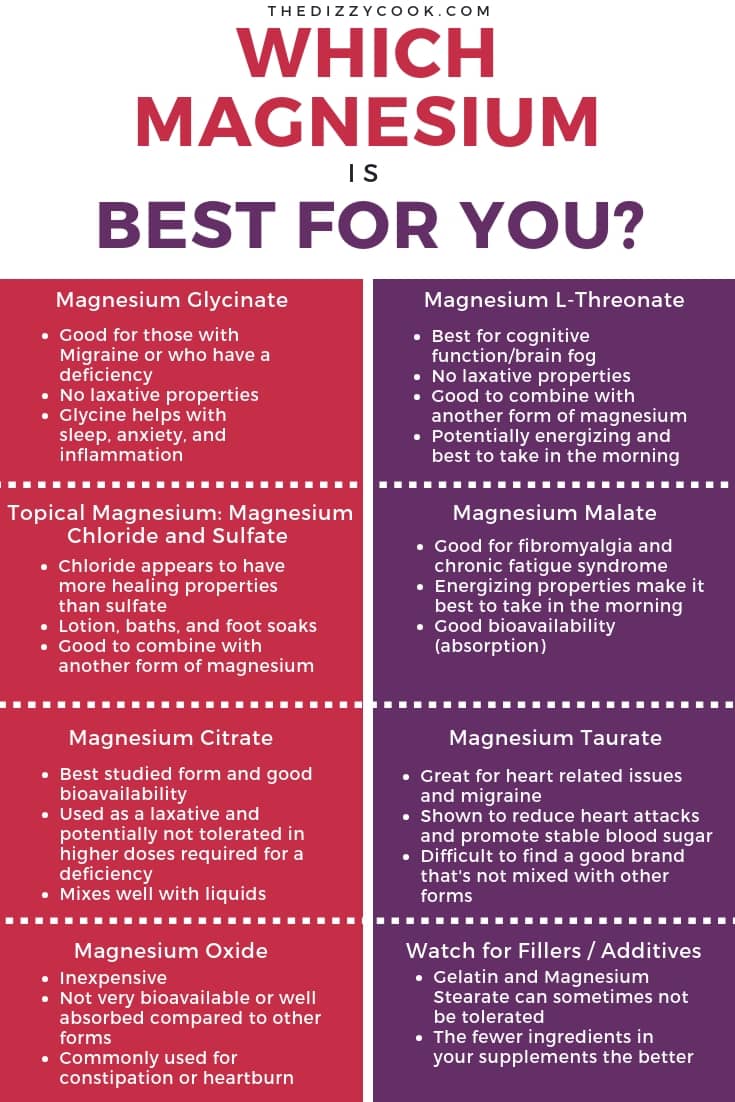
Magnesium Posts
For more helpful information on magnesium and other supplements for migraine, check out these articles.



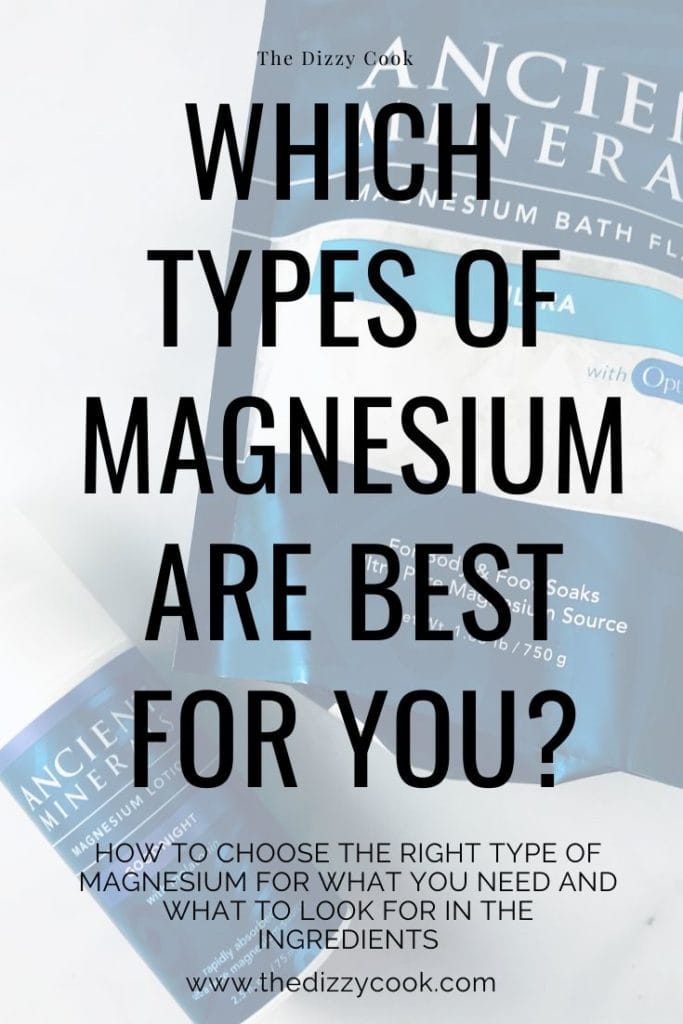
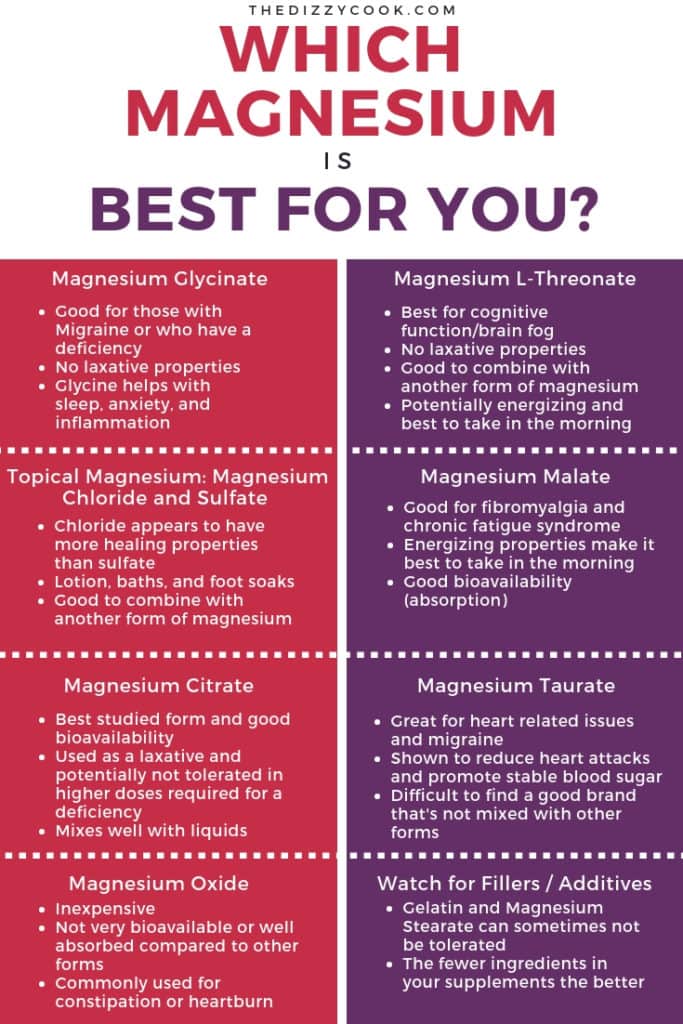
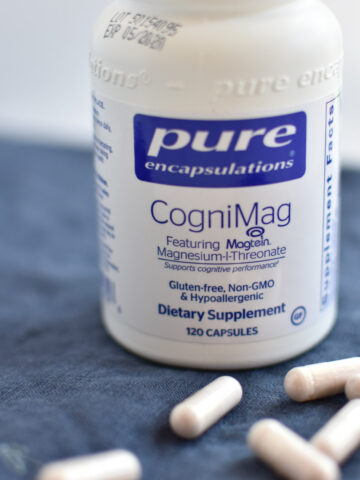
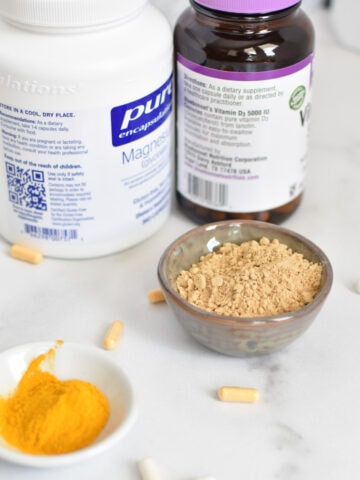
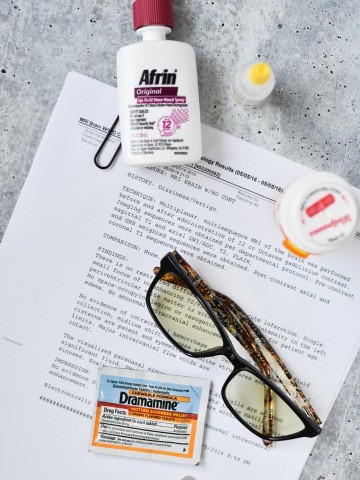


Ps: Alicia have you heard of or used Intelligent Labs Magenhance? My otolaryngologist recommended it to me. I haven’t purchased it yet.
It looks like a good mix. I just prefer to buy separately since I get a good discount and can mix and match however I need them! I don't think I'll ever go back to a combined pill, but this seems like a decent one if that works best for you!
Hi Alicia! Thank you for all of the excellent information you have put on your website! I was just diagnosed w vestibular migraine and trying to get it under control. I have ordered the Pure brand magnesium glycinate, cognimag and magnesium citrate. I hope they work & if not, at least I tried. Going to stay positive! I will come back and let you how they are working out once I begin taking them. Again thank you for all your words and encouragement!!!!!
Hey Christina, I'm so excited for you! Remember to give them a few months before making any judgements. Everything takes some time to work!
I have often tried magnesium at different times over my life. I really want it to be of help but it does seem that it contributes to headache at times. I have read where we who suffer migraines are extremely sensitive to all things including mineral imbalances. In all your connections over the years with migraine sufferers is there a subset where supplementing with magnesium has the opposite effect due to mineral imbalance when magnesium is introduced? Just curious. Thanks
I have seen some people just not tolerate certain ones very well. Usually a switch of a brand or a type helps a lot. But I haven't come across many people who can't tolerate it at all. But don't worry, we know our bodies best. Feverfew does that to me! I think there are so many good options out there, don't feel like you're missing out without magnesium. If you haven't tried it yet, usually the ones who don't tolerate the pills well, do fine with the lotion or soaks.
Hi Mary Beth, I just started on magnesium two weeks ago and I have had the worst headaches every single day since starting. It is definitely the magnesium. I am on my third type of magnesium and I have finally quit. In addition, they were all making me constipated with dark stool. I am wondering if you found anything that has not given you a headache.
HI, are you familiar with Migrelief? Some neurologists rec. as a daily preventative.
Yes, I actually used to take it before they changed the formula. Now they include feverfew which I don't react well too and many people I know don't either. I wish they would leave it out. The other thing was at the time, the types of magnesium they used did not sit well with me. Finally, as I've started to feel better I've realized I no longer need to take b2 anymore. I think it's helpful for people who literally won't take supplements unless it's 2 pills, otherwise it's best to keep them separate to know whats helping or what might be bothering you. I find I'm just better off mixing and matching the supplements that work best for me.
Interesting, thanks for your feedback!
I have a loved one who has suffered migraines for years. I am sending her your article. But she is very research and science-oriented and, frankly, exhausted by years of trying different medications and supplements for her migraines and her digestive problems and depression. Your article is interesting and I recently heard of someone who got good results with his migraines after taking magnesium. I plan to sent this article to my daughter, but I know she will want your sources, too. Could you send them to those or post them here?
Hi Rhonda,
Yes so if you click on the links within the post (the highlighted words), it will take you to the studies that I've used for sources (Via pubmed, magtein, etc.) directly related to what I'm discussing in that part of the article. I hope that helps.
You recommended goodnight lotion, however, it has melatonin in it. Is that okay?
Any thoughts on magnesium gluconate? I tried glycinate but I believe it's making me dizzier 🙁 . Citrate didn't agree with my system.... Taurate seems tolerable but not doing much for my muscle spasms. I'm already dizzy, and trying to make sense of it all makes me even dizzier!
Definitely go with whatever works best for you! This is just a jumping off point for people but it won't work for everyone. You may like threonate too.
Thank you for writing this! I've been battling VM since 2011 and recently discovered your site and love it. I'm a month into the HYH diet (bought 3 cookbooks!) and considering adding supplements. Would you recommend potentially combining Magnesium Glycinate with Magnesium L-Threonate? You mentioned the latter would be good to combine with another form so curious if this combo is something you are familiar with. I feel I'd benefit from each of their strengths so having trouble deciding which to try first. Could I do that dosage-wise with the Pure Encapsulations products you link to? It seems I could take the L-Threonate in the AM, and the Glycinate in the PM. My brain is super sensitive to anything so the thought of trying two supplements at once scares me. Thank you again.
Hey Jared - yes I personally combine them, just check with your physician but most usually ok it. I have how I take my magnesium here.
What is your recommendation for taking the magnesium glycinate? Morning or evening or spread out throughout the day?
Hi Tracy, I spread mine out through the day initially, but now I take all at night. Test out a few ways and see what works best for you!
Fantastic article.
Really, a massive thanks to you.
I will now go away and test these out understanding just what I want to get out of them.
Many thanks,
Daniel
I'm thrilled it was helpful for you!!
Hi I suffer from classic migraine with aura I also suffer with anxiety and raised BP could you recommend which magnesium I would need please
Many thanks
Kelly
Hey Kelly, most people like glycinate for anxiety, but because of your raised BP please consult with your physician to have him or her clear it first. All the best
Hello, my daughter was diagnosed 2 yrs ago with VM and she is taking nortriptyline 40 mg every night, I want her to start taking the magnesium glycinate however I want to make sure it is ok with the nortriptyline do you have any info on drug interactions by chance? I have searched the web and was not able to find anything.. thank you
Hey Patti - please reach out to your physician! I'm not qualified to give you that kind of advice online. I have a lot of friends that do both, but it was cleared through their physicians. 🙂
Hello, just found ur blog via the magnesium & migraine articles!
I've had chronic intractable freq migraine since about 2014, prior to that was episodic. Am going to look more at diet info u post etc as I thi k Mag in any form may not be option for me. Initially got supplement list from my dr and it listed the typical mag oxide which made me very sick. I tried a number of the supplements & all created nausea or worse ed IBS or caused gastritis, so I gave up, was $$ and tiring. After failing all the preventative meds I've tried, am going back to drawing board & revisiting supplements, to see if I can find gentle forms, so it article was really interesting.
I decided on L-Threonate and noticed a difference on day 1, TMJ relaxed & tinnitus lessened and I felt less pain overall, more relaxed. BUT, also felt nausea and cramping. I persisted becuz am guessing am likely low in Mag. Even irritable bladder suddenly felt better. Lol this was day 1 or 2.
But by day 3, the nausea turned into what felt like beginnings of acute gastritis. Colicky, painful cramps that kept me awake all last night and are still present today, but a little less as I stopped the Mag. I never get this symptom with food or IBS, just with supplements or meds that irritate gut.
It sounds like the tropicals are minimally absorbed so I guess...diet?
Thought about trying mag glycinate too but now, no way. This right now means a week of cramping til things calm down, & L-threonate is supposed 2b less irritating than glycinate. This is same reaction I had with oxide. Very sensitive gut.
I think topicals are still worth a try, especially bath and foot soaks. You may find them to be beneficial. Is it possible you were taking too high of an amount of magnesium or perhaps additives in the brands you were taking? I do have some readers who were bothered a lot by taking glycinate (which rarely happens, but it does happen) and did great with citrate or malate, which aren't supposed to be as easy on the stomach. I know it's kind of an expensive test, but may be worth trying a few types in very low doses. Especially if you noticed a quick difference like that. Maybe your doctor will have some good suggestions!
Thanks for your reply! The glycinate might be worth a try, but think will try tropicals first as u suggest. My doctor gave me a supplement list with the typical Migraine blends with Mag Oxide I think. They're not much help with supplements, which is why I was excited to find this article, is really informative !
Glad it was helpful!
For those reading this article, you can get discounted prices on these brands here: https://us.fullscript.com/welcome/thedizzycook
How are we able to order from Fullscript? A window pops up asking for an e-mail and password.
Thanks,Kim
Hi Kim, You have to create an account with an email and password to be able to access the discount. It's a private resource. If you have any more issues just email me alicia@thedizzycook.com and I'll help you out.
This was a very well written article and I feel like I learned a lot. I recently started taking Migravent since it has the B2, magnesium, and CoQ10 but I was disappointed when I realized it was a combination of Magnesium citrate and oxide. I have IBS so my stomach is already a mess. Honesty I haven’t really been able to tell yet if it’s affecting my digestion. Since I tend to learn towards IBS-C, I kind of hoped it would help. I’m thinking about switching to a B Complex vitamin and trying one of your above magnesium supplement recommendations. I don’t need any additional digestive issues.
Just a quick question, do you have any knowledge on whether these supplements can help treat TMJ and rebound migraines? I’ve suffered for 20 years with headaches and migraines but having TMJ has now made things worse.
Hey Erin, They can help you get through the pain of getting out of rebound and also help TMJ - I would definitely go with glycinate which will have all those relaxing properties you need!
Thank you for getting back to me. I'm ordering that specific type today!